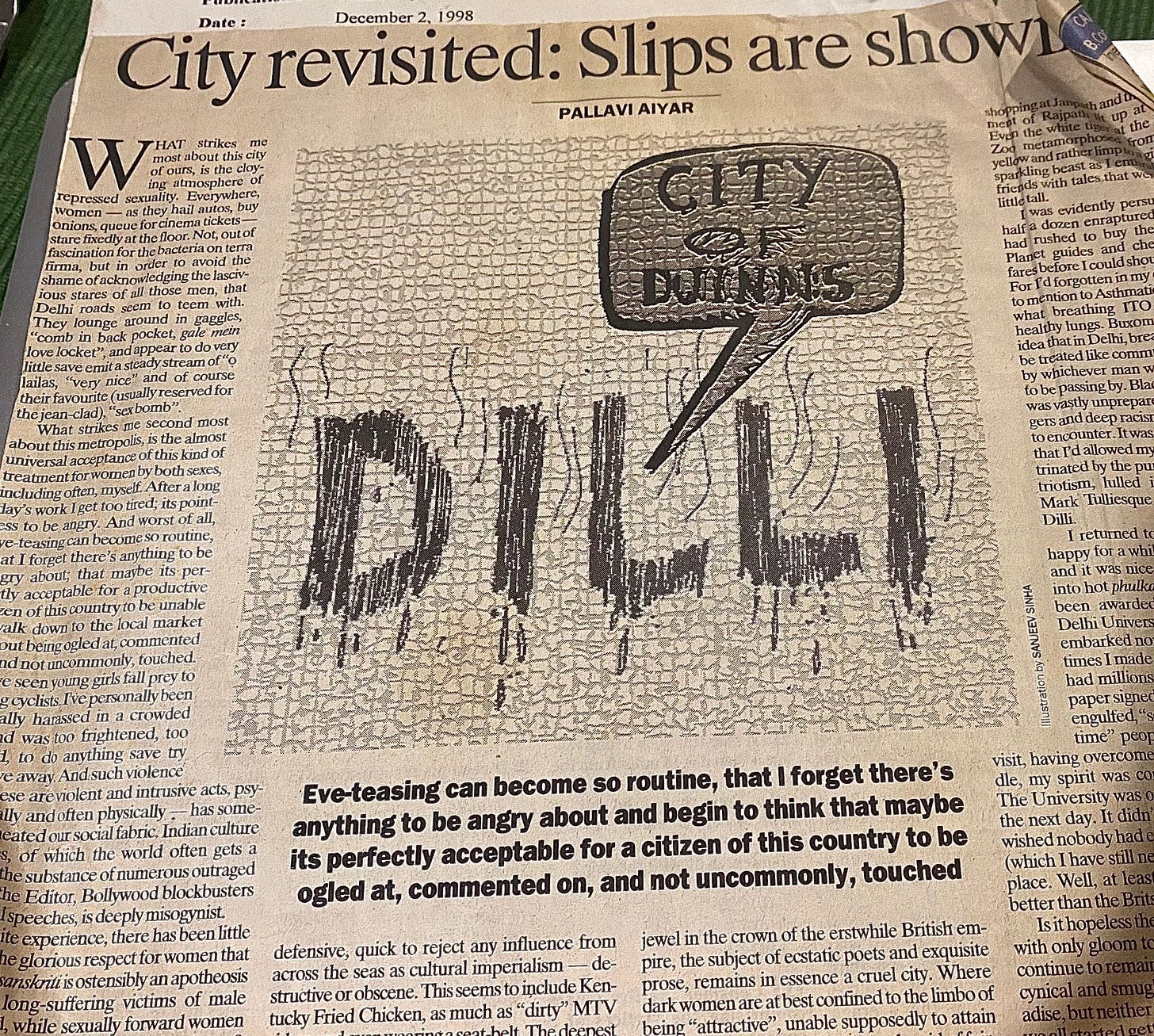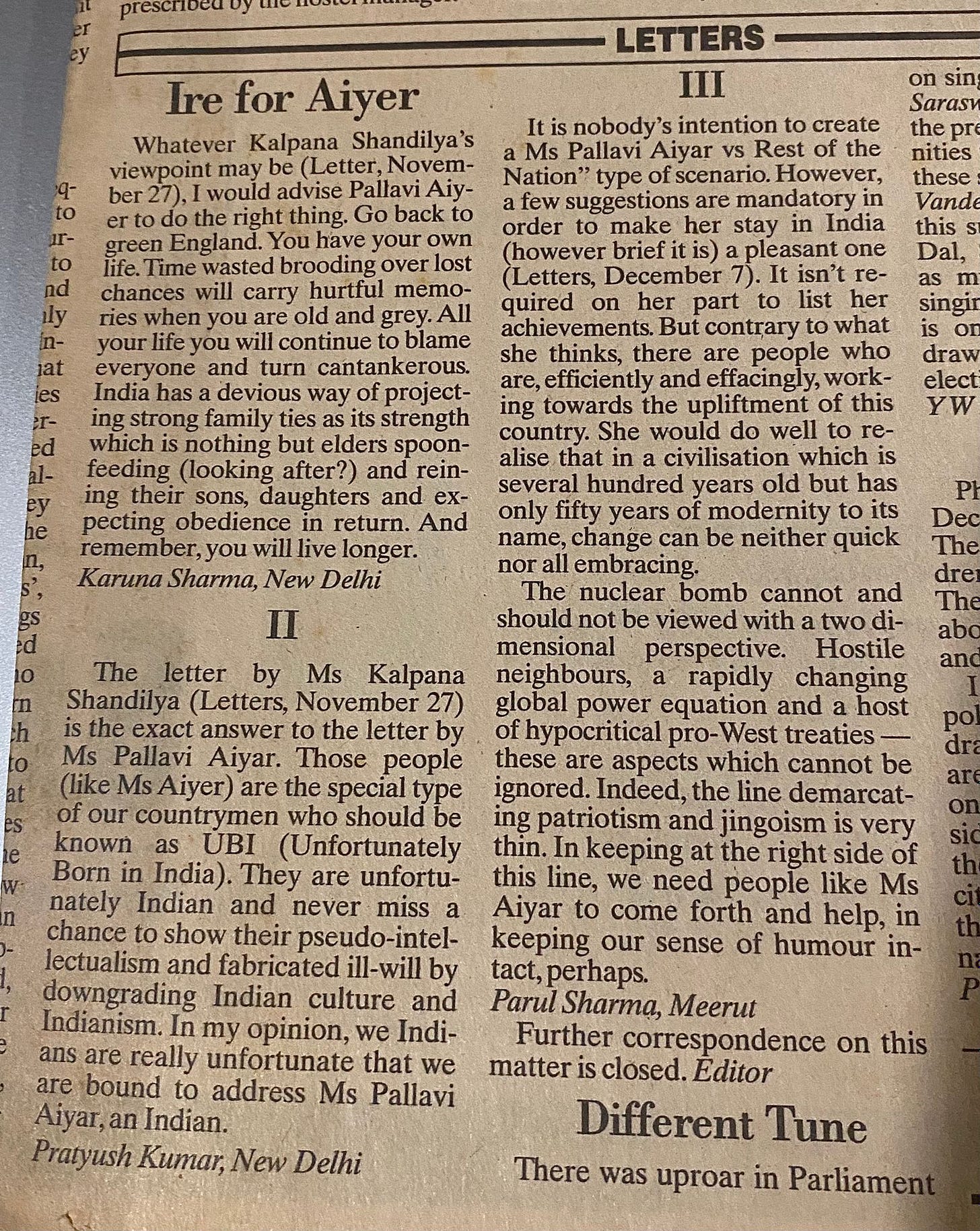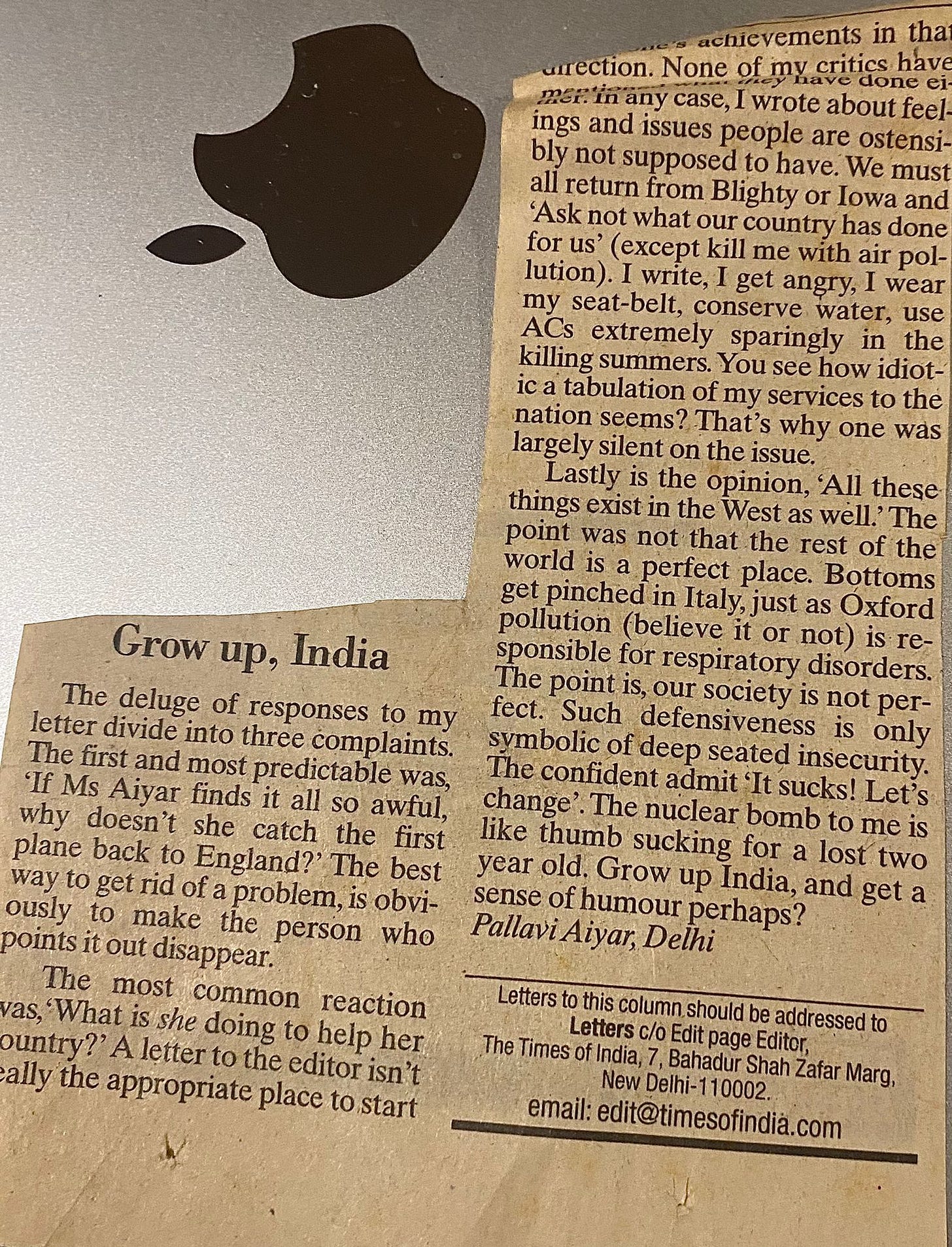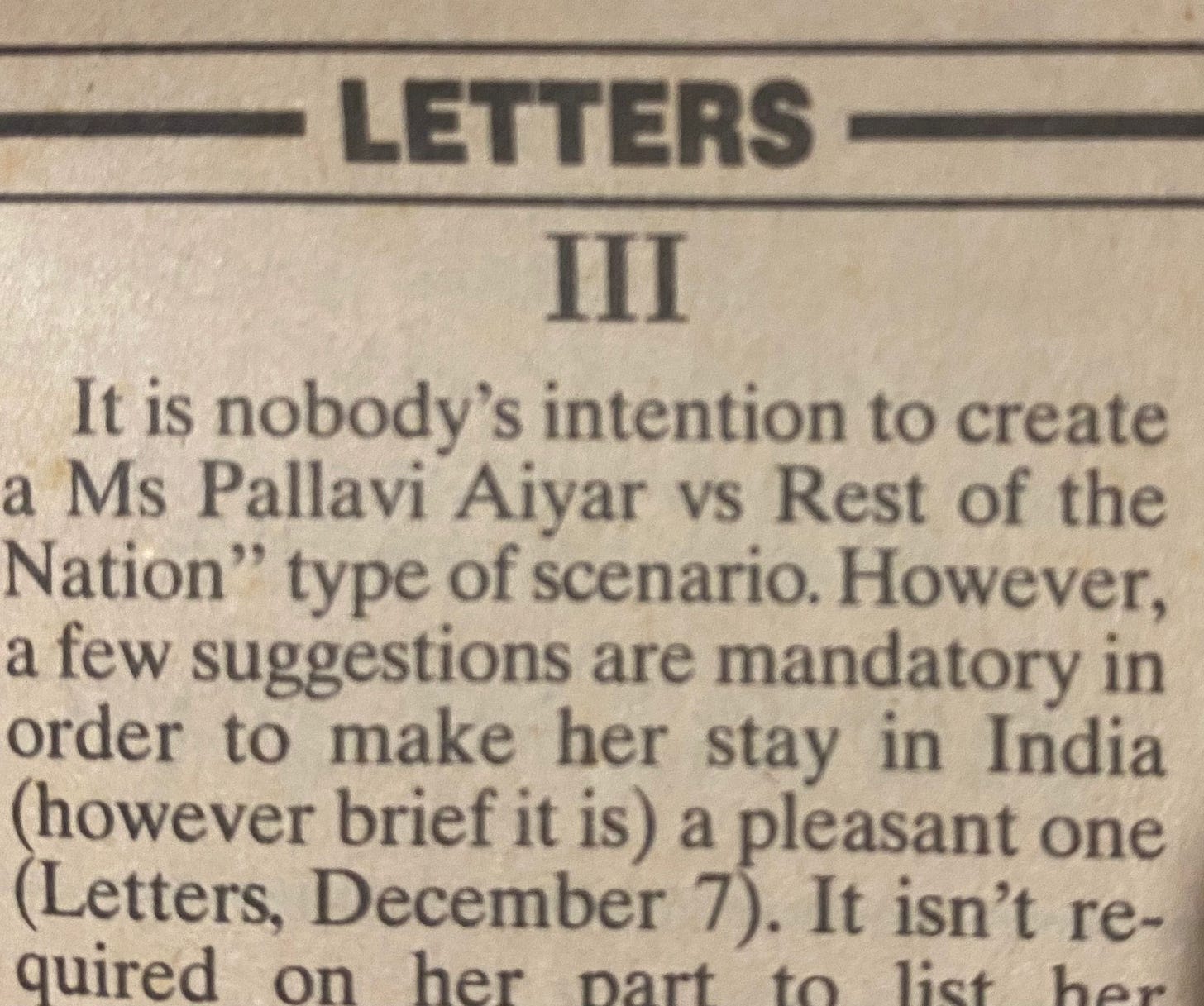Dear Global Jigsawers,
I’ve been in Delhi for the last 3 weeks, after a gap of two years. Yesterday, I was asked by my mother to sort through the sundry photographs, school certificates, letters from boyfriends, diaries and sundry other flotsam of my youth that she’s been holding on to for me, for a couple of decades.
Amongst the dusty notebooks and clippings, I came across the very first newspaper article I published. It was for the Indian Express newspaper, written on December 2, 1998, a couple of months after I’d returned to Delhi after having graduated from Oxford University.
This was a period I’d found myself looking at the city of my birth with an outsider’s perspective for the first time. And what I saw was unedifying. I am reproducing that article as this week’s post, for (unfortunately) it resonates strongly even today, more than 23 years after it was written.
As much as I love India, I continue to believe that the vanity projects and military gadgets that are meant to signal India’s arrival on the global stage are doomed to sputter and die unless the country can improve the abysmal reality of the systematic denial of agency to women.
******
City Revisited:
What strikes me most about this city of ours, Delhi, is the cloying atmosphere of repressed sexuality. Everywhere, women- as they hail autos, buy onions, queue for cinema tickets stare fixedly at the floor. Not out of fascination for the bacteria on terra firms, but in order to avoid the shame of acknowledging the lascivious stares of all those men that Delhi roads seem to teem with. They lounge around in gaggles and appear to do little save emit a steady stream of “O! Lailas,” “very nice” and “sex-bomb.”
What strikes me second most about this metropolis is the almost universal acceptance of this kind of treatment of women by both sexes, including often, myself. After a long day’s work, I get too tired; it’s pointless to be angry all the time. And worst of all “eve-teasing” (as harassing women is euphemistically referred to in India) can become so routine that I forget there’s anything to be angry about; that maybe it’s perfectly acceptable for a productive citizen of this country to be unable to walk down to the local market without being ogled at, commented on, and not uncommonly, touched.
I’ve seen young girls fall prey to passing cyclists. I’ve personally been physically harassed in a crowded bus and was too frightened, too shocked to do anything save move away. And such violence for these are violent, intrusive acts, psychologically and often physically- has somehow permeated our social fabric. Indian culture and values, of which the world often gets a mouthful from legions of chest thumping patriots, is deeply misogynist.
In my finite experience there has been little evidence of the glorious respect for women that out bharitiya sanskriti (Indian cultural heritage) is ostensibly an apotheosis of. Why are long-suffering victims of male abuse glorified, while sexually forward women censored ot caricatured as prostitutes? Indian culture has become diseased with an ulcerous morality. It is the wont of culture and morality to be fluid. Yet too many seem determined to freeze ours in an ontological trap, invalid and corrupt.
This puzzles me: the extent to which we are defensive, quick to reject any influence from across the seas as cultural imperialism- destructive or obscene. This seems to include everything from “dirty” MTV videos to even wearing a seat belt.
The deepest misconception appears to lie in the idea that censorship is the panacea to all ills. I would prefer a culture where everyone indulges in gluttonous phone sex, if riding a bus ceased to be a traumatic experience.
Dilli, the seat of the mighty Mughals. The jewel in the crown of the erstwhile British empire, the subject of ecstatic poets and exquisite prose, remains in essence a cruel city.
And yet, I love it. Mourn for it. When away, long for it. As a student in Oxford, I extolled its virtues: the grandeur of the Red Fort, the leafiness of Lodhi Gardens, the charm of shopping at Janpath and the excitement of Rajpath lit up at night. Even the white tiger at the Delhi Zoo, metamorphosed in my tellings from pale yellow and rather limp to a gigantic, sparkling beast as I enthralled foreign friends with tales that were only a little tall.
I was evidently persuasive for half a dozen enraptured students had rushed for their Lonely Planet guides and cheap return fares before I could shout, “Don’t!”
For I’d forgotten in my enthusiasm to mention to Asthmatic American what breathing Delhi air did to healthy lungs. Buxom Brit had no idea that in Delhi breasts tended to be treated like communal property by passersby. Black Botswanian was vastly unprepared for the sniggers and deep racism she was likely to encounter. It was shaming for me that I’d allowed myself to be indoctrinated by the purple prose of patriotism, lulled into a romantic Mark Tully-esque view of Dilli-O-Dilli.
I returned to my city and was happy for a while. This was home, and it was nice to be able to tuck into hot phulkas once again. I had been awarded a gold medal by Delhi University and full of pride I made the journey to the north campus to collect it. Four times I made the journey queued, had what felt like millions of minuscule chits of paper signed by tea-gulping, ennui-engulfed, “sorry-madam-it’s-lunch-time’ people. Finally, on the fifth visit, having overcome every conceivable hurdle, my spirit was comprehensively crushed: The University was on strike.
I didn’t go back the next day. It didn’t seem worthwhile. I just wished nobody had given me a gold medal (which I have still never set eyes on) in the first place. Well, at least there’s something we do better than the Brits: red tape.
Is it hopeless then? Hideous and despairing with only gloom to look forward to? Yes, if we continue to be divided between the wearily cynical and smugly parochial. Delhi is no paradise, but neither is change impossible. Maybe if we all started getting a little less “adjusting,” and a little angrier, I could stop writing articles like this one and indulge instead in euphoric eulogies of this City of Djinns, like I always wanted to when I grew up.
*******
My 1998 article, written when I was 22 years old, attracted so much ire, that the newspaper’s Letters to the Editor section exclusively carried responses to my piece under the heading, “Ire for Aiyar” for three consecutive days, followed by a response from me, after which they closed the topic for discussion.
The newspaper might have closed the topic for discussion, but as far as I am concerned, it remains sadly germane. Please let me know what you think in the comments section and don’t forget to share with your friends.
I would appreciate your subscribing to the Global Jigsaw to keep it going in the New Year. In the meantime, here’s wishing everyone a fantastic holiday season and some kind of post-COVID 2022.
Onwards and upwards!
Pallavi








Amazing, that the article fits 2021 as much as it did when you wrote it. Like they say, for everything that has changed, everything remains the same. Your response to the angry readers were perfect. I enjoyed reading them, thanks for sharing. Please pass our thanks to your mom for getting you to clean your attic, if you continue with it, we are likely benefit with more such interesting finds.
Mindset remains static.